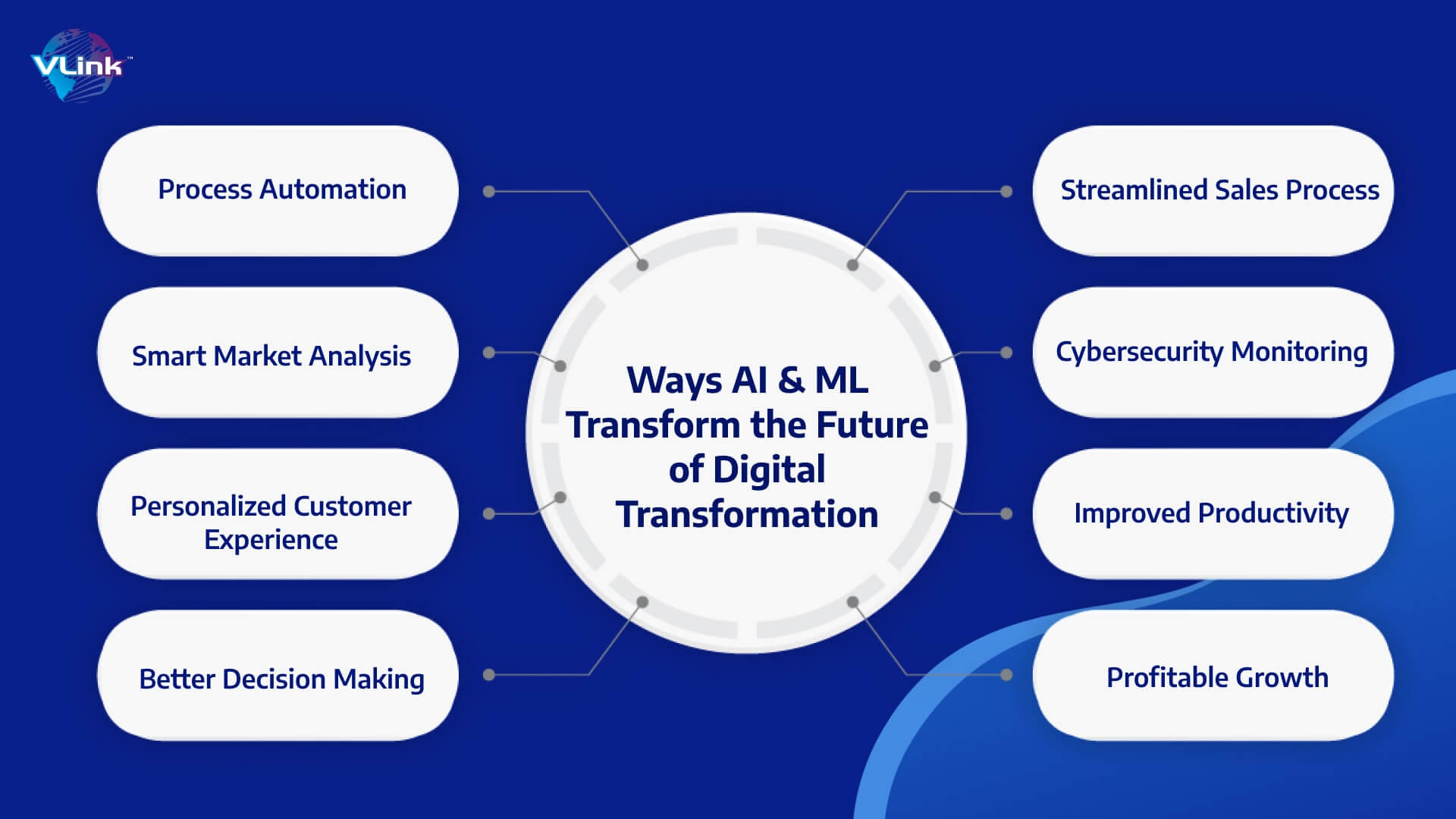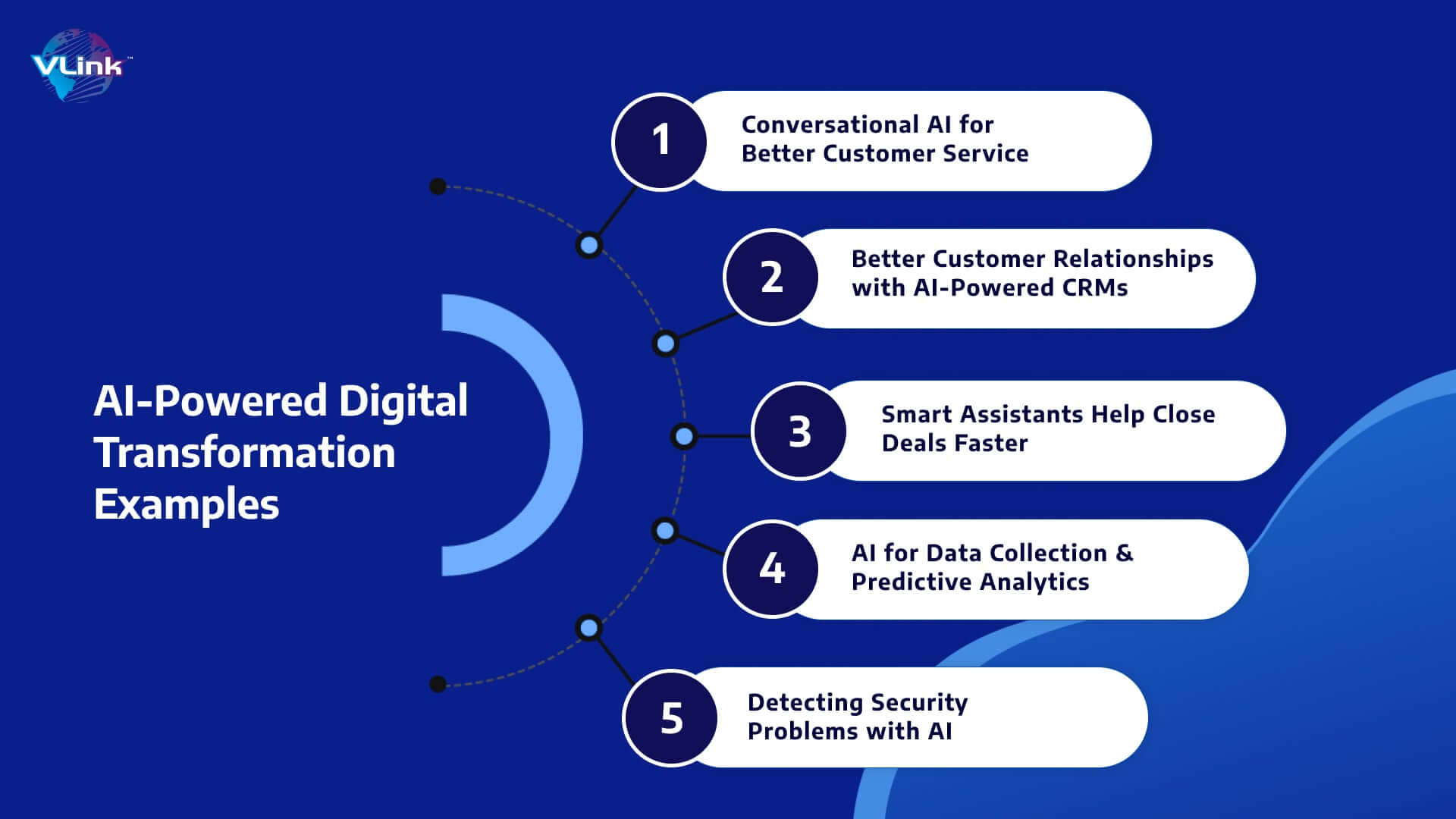AI & ML is one of the emerging technologies in digital transformation that help businesses deliver unforgettable digital customer experiences. They enable the emergence of new business innovations.
AI (Artificial Intelligence) is projected to achieve a CAGR of 52% by 2025, indicating its rapid adoption by worldwide businesses. The global Machine Learning (ML) market size was valued at $ 19.20 billion in 2022. And this figure will reach $ 26.03 billion in 2023 to $ 225.91 billion by 2030, indicating a CAGR of 36.2%.
Collectively, they enhance growth prospects for businesses focused on prioritizing customers and striving to leverage the extended possibilities of digital transformation fully. The integration of AI is currently permeating and being put into action across diverse industries, including but not limited to national security, healthcare, logistics, and education.
Let’s see how AI & ML will revolutionize the future of digital transformation.
8 Ways AI & ML Transform the Future of Digital Transformation

The primary advantage businesses can derive from technologies such as artificial intelligence is the comprehensive automation of processes. AI & ML is envisioning future by automating diverse processes, enabling business stakeholders to allocate their attention to other essential responsibilities.
The efficacy of AI in effectively handling various cognitive tasks has proven immensely advantageous. The intelligent algorithms of AI possess the aptitude to comprehend and execute assorted assigned tasks.
This specific proficiency is positioned to facilitate automation integration across various business sectors, encompassing financial institutions, medical establishments, retail conglomerates, and numerous others.
Most companies focus on innovative market analysis to grab a competitive edge in their domain. But now, thanks to the emergence of AI-influence, it has become pretty easy to stack and identify market data effectively. This software is designed to help businesses understand the sales matrix and conversions of customers.
Machine learning & AI development services play a vital role in understanding the market spectrum by analyzing and powering a massive amount of available data for startups. You can create proactive marketing strategies through a data-driven approach.
Old-school sales techniques like calling and email marketing are becoming outdated daily. Now, it’s time to understand your customers’ needs and ways to fulfill them.
To create an advanced sales process, organizations can utilize AI-powered CRM platforms. They can build and manage customer databases, allowing business stakeholders to see how different leads can be materialized through proper strategies.
These sophisticated multitasking platforms empower businesses to handle customer data effectively and enhance sales processes.
Every business knows customer service's significance in driving sales growth and fostering long-term customer loyalty. Consequently, it becomes the primary obligation of all stakeholders to elevate the customer experience by utilizing all accessible resources.
In alignment with present trends, the method of choice for capturing people's interest is through personalized customer experiences.
By harnessing robust systems integrated with machine learning algorithms, companies can present tailor-made services to customers based on their specific requirements. Achieving this necessitates understanding their preferences, and machine learning technology excels at delivering such solutions with exceptional precision and accuracy.
Artificial Intelligence and Machine Learning can examine extensive volumes of data and uncover insights that might elude human observation. This capability proves instrumental in assisting businesses to enhance their decision-making processes.
It encompasses tasks like recognizing emerging market prospects or refining the efficiency of supply chain operations.
Utilizing AI and ML enables the real-time monitoring of cybersecurity threats and the identification of anomalies, effectively mitigating the potential for data breaches and other security breaches.
Also learn: the importance of cybersecurity in the age of IoT.
Digitalization has empowered organizations to expand and generate income by utilizing advancements in Artificial Intelligence. The incorporation of AI contributes to revenue growth for companies in diverse ways.
It enables enterprises to identify areas of vulnerability and generate precise forecasts concerning potential opportunities, competition, and shifts in market trends.
AI possesses exceptional speed, effortlessly and instantly analyzing extensive volumes of data to enhance the quality of decision-making processes.
Leveraging Artificial Intelligence to automate distinct manual tasks empowers organizations to achieve heightened productivity. This assertion is substantiated by numerous studies indicating that AI contributes to productivity growth of 40% or higher.
Artificial intelligence effectively enhances productivity through various avenues. It can swiftly gather and compile information, thereby saving valuable employee time that can be channeled toward core objectives.
Furthermore, AI can execute intricate computations, recognize patterns, and automate repetitive tasks. Consequently, organizations gain a competitive advantage by efficiently obtaining insights that facilitate well-informed decision-making.
5 Examples of How AI-Powered Digital Transformation Revolutionize Business Operations

The evolution of conversational AI spans from basic chatbots to intricate virtual customer assistants.
Basic FAQ bots address common inquiries from visitors. Users input keywords, and the bot, powered by machine learning, provides fitting responses.
Advanced virtual personal assistants like Amazon's Alexa, Apple's Siri, and Google Assistant handle intricate and personalized queries, aiding users in tasks and purchases.
Cutting-edge virtual assistants like Microsoft Power Virtual Agents identify context, like the nature of the issue and customer profile, and selectively direct incoming requests to relevant bots.
Also Read: step by step guide to digital transformation journey for IT leaders.
AI equips sales teams with a comprehensive customer overview from web searches, order history, and product feedback. This insight aids in comprehending customer needs, elevating engagement, and automating routine CRM tasks.
Prominent CRM software solutions, including Zoho, Salesforce, Sugar CRM, and Siebel, leverage AI to process customer input and offer intelligent brand recommendations.
Amazon's AI recommendation engine facilitates targeting distinct personality groups. ASOS accurately predicts lifetime customer expenditure, while OTTO's machine-learning algorithms optimize inventory and forecast purchases with a remarkable 90% accuracy over the upcoming month.
Advanced sales assistant software like Google's Nespresso Assistant anticipates the requirements of shoppers through a streamlined three-step procedure:
- Intelligent assistants pose precise questions that assist buyers in discerning their desires or necessities.
- These AI-driven systems employ algorithms to recognize and propose suitable products to buyers.
- The astute system assists buyers in concluding their purchases.
AI-guided sales are particularly satisfying due to their minimal human intervention approach, converting leads with minimal human interaction. This trend is projected to be adopted by approximately 60% of forward-looking companies by 2025, positioning it as the fastest-growing sales trend.
Imagine gaining insights into your company's future, allowing you to preemptively avoid pitfalls and automate actions that lead to enhanced profitability.
AI's machine learning-powered software achieves this through tools like SAS Advanced Analytics. This software scrutinizes business data to infer which products and marketing tactics will most likely draw attention while identifying potential business opportunities.
This intelligent software incorporates the following:
- Anomaly detection enables the identification of ineffective marketing strategies or the removal of features that deter potential customers.
- Sentiment analysis aids in accessing public opinions about your brand on social media and suggesting ways to enhance your products.
Additional predictive analytic capabilities encompass fraud detection and attrition, turnover, and retention projections.
Also Learn: predictive analytics use in manufacturing industry.
This technology empowers you to navigate your business landscape with foresight and precision.
Artificial intelligence is a tool for businesses to bolster their physical security and cybersecurity measures, safeguarding their intellectual property.
Security screening is deployed by authorities to scrutinize individuals with suspicious behavior. An instance is AVATAR, a creation of the US Department of Homeland Security, which employs AI to analyze body language and facial expressions.
In security and crime prevention, AI-driven crime tools like Armorway from California utilize machine learning algorithms to predict potential terrorist threats.
Endpoint protection, with vendors such as Skycure, Lookout, and Wandera, employs AI software to detect susceptible endpoints and thwart data breaches.
Advanced cyber protection is seen in Darktrace's Enterprise Immune System, which employs AI to monitor emerging cybersecurity risks continuously.
How Can VLink Help Businesses with Digital Transformation?
VLink is a leading digital transformation service provider that helps companies grow in the competitive digital world. The ecosystem modules encompass all facets of these organizations, capitalizing on their strengths and delivering a superb user experience to their members.
The digital transformation platform we offer automates every aspect of membership management, enabling you to both maintain and expand your community of members. This solution saves you valuable time and resources and allows you to concentrate on your primary goal: delivering an exceptional experience to your members.
Frequently Asked Questions
AI-powered tech trends are shaping the digital transformation landscape. Hyper-automation, driven by AI and ML, streamlines operations, and AI-driven customer experiences enhance engagement.
Edge computing, empowered by AI, optimizes real-time data processing. Ethical AI practices ensure responsible adoption. These digital transformation trends collectively redefine industries and elevate innovation in the digital era.
Digital transformation offers business owners enhanced agility, efficiency, and customer engagement. It optimizes operations, reduces costs, and unlocks new revenue streams. Embracing technology ensures competitiveness in the evolving market, making it a compelling choice for modern enterprises to stay relevant, efficient, and customer centric.
Digital transformation revitalizes business by automating processes, enhancing customer experiences, enabling data-driven decisions, and fostering innovation, leading to increased efficiency, competitiveness, and growth in the modern landscape.








